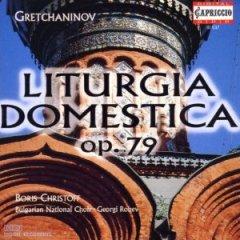Alexander Gretchaninov - Liturgia Domestica Op.79 (1996)
Alexander Gretchaninov - Liturgia Domestica Op.79 (1996)

1. Liturgia Domestica Op. 79: Great Litany 2. Liturgia Domestica Op. 79: Antiphon I 3. Liturgia Domestica Op. 79: Antiphon II 4. Liturgia Domestica Op. 79: Gloria & Unigenitus 5. Liturgia Domestica Op. 79: Trisagion 6. Liturgia Domestica Op. 79: After The Gospel 7. Liturgia Domestica Op. 79: Litany Of Supplication 8. Liturgia Domestica Op. 79: Cherubic Hymn 9. Liturgia Domestica Op. 79: After The Cherubic Hymn 10. Liturgia Domestica Op. 79: Credo 11. Liturgia Domestica Op. 79: Pax Hominibus 12. Liturgia Domestica Op. 79: Hymn Of The Blessed Virgin 13. Liturgia Domestica Op. 79: Pater Noster 14. Liturgia Domestica Op. 79: Laudate Deum 15. Liturgia Domestica Op. 79: End Of The Liturgy Boris Christoff - bass Bulgarian National Choir & Radio CO Georgi Robev – directo, 1979
The long-lived Alexander Grechaninov was, until the latter twentieth century, a largely neglected figure seen as having written a few worthwhile liturgical works and some attractive children's music, but little more. Then, his five symphonies and other orchestral compositions garnered some attention, while his many stage works awaited rediscovery. Stylistically, he was very conservative, and as neo-Classical, serial, and other progressive techniques took hold in the twentieth century, his music was increasingly viewed as outdated. Had it not been for the stubborn opposition of his uneducated father, who could barely read, Grechaninov may have developed sooner. He began study on the piano at the relatively late age of 14, mainly owing to the urging of a caring sister-in-law. Grechaninov enrolled at the Moscow Conservatory in 1881 over the objections of his father. There he studied piano first with Nikolai Kashkin, then later with Vasily Safonov. He also took instruction in composition from Taneyev and Arensky, the latter largely in fugal writing. He left Moscow in 1890 for further study with Rimsky-Korsakov at the St. Petersburg Conservatory. His Concert Overture (1892 - 1893) gave Grechaninov his first success, and his 1894 String Quartet captured a prize at the Belyayev Chamber Music Competition. He supported himself and his wife (whom he married in 1891) during this time as a piano teacher. Perhaps his greatest success in the nineteenth century was the 1895 premiere of his Symphony No. 1 (led by Rimsky-Korsakov). In 1896, he relocated to Moscow once again, where he taught piano and worked on several compositions, chief among them his opera Dobrinya Nikitich (1895 - 1901) and the first of his four Liturgies of St. John Chrysostom (1897). He also wrote incidental music for plays during this time, such as his score for The Death of Ivan the Terrible (1896). In the first decade of the twentieth century, Grechaninov arranged many songs of ethnic origin for children, producing several popular numbers and giving him great prominence among Russian composers. In 1906, he accepted teaching posts at the Moscow Conservatory and Gnessin School of Music. Throughout his career, Grechaninov composed many works in the sacred genre and in recognition of this continuing work, the Tsarist government granted him a yearly stipend of 2,000 rubles. After the Bolshevik Revolution, he lost the stipend and ultimately his faith in his homeland, feeling his religious and political convictions were at odds with those of the Communist regime. After several trips abroad, he emigrated to Paris in 1925, where he established a career as a pianist and still managed to devote much time to composition. He completed his third St. John Chrysostom Liturgy there (1917 - 1926), as well as his Suite for cello and orchestra (1919 - 1929). In 1929, he made the first of several trips to the United States, a country he felt increasingly drawn toward. In 1939, he emigrated to the United States, ultimately making New York his home (1940). He continued to compose in his adopted homeland, especially in the sacred realm, producing several important works, including Et in terra pax, a Roman Catholic Mass (1942). He also wrote chamber works, but his output steadily declined in the 1940s. He became a U.S. citizen in 1949, at the age of 85. His last composition came in 1950, the piano work Lettres amicales. Grechaninov was well enough to attend a 1954 concert in New York Town Hall, held to celebrate his 90th birthday. ---Robert Cummings, Rovi
download: uploaded anonfiles yandex 4shared solidfiles mediafire mega filecloudio
Last Updated (Monday, 02 December 2013 17:38)








